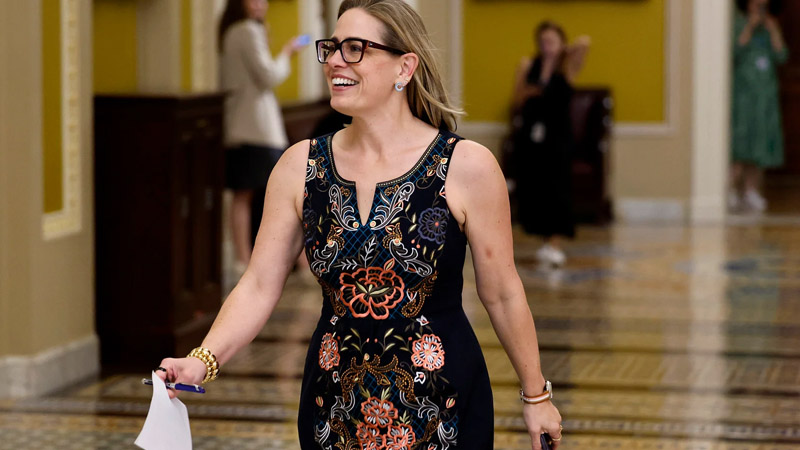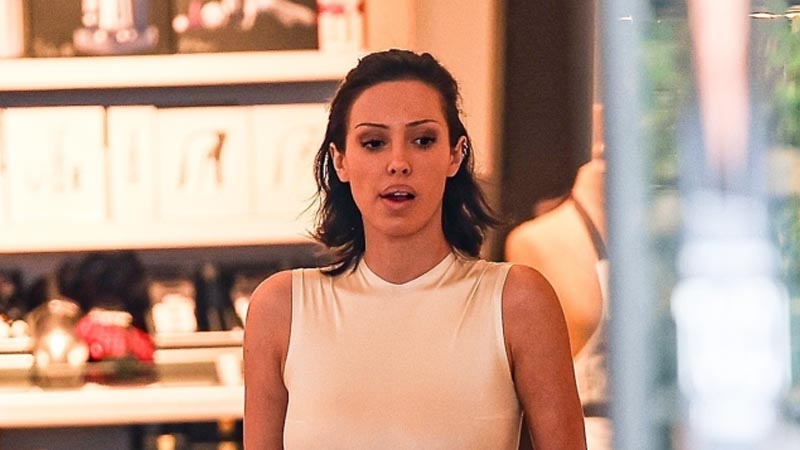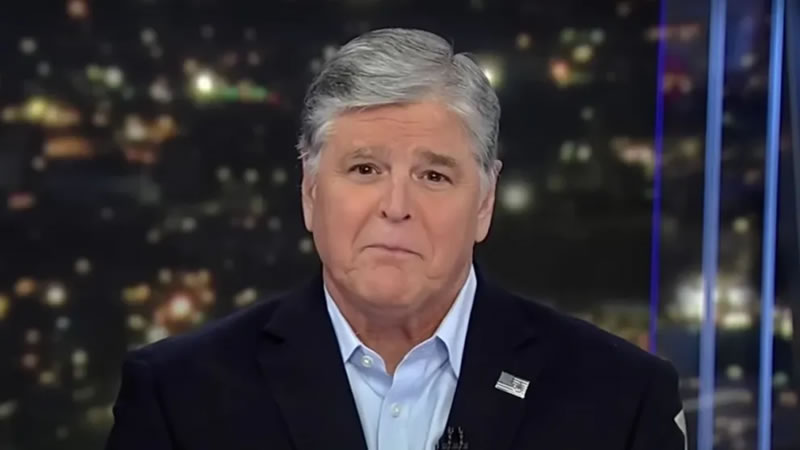The Potential Absence of Prominent Abortion Rights Groups in Arizona’s Critical 2024 Senate Race

CHIP SOMODEVILLA/GETTY IMAGES
Abortion is set to be a major issue in 2024’s most competitive Senate races, including in Arizona, where the legality of the procedure has been mired in confusion since last summer. But abortion rights groups could stay on the sidelines in the state after a party switch by the senator whose seat is up next year.
If Sen. Kyrsten Sinema, who formally left the Democratic Party in December, chooses to run for a second term, she’s set to be the only pro-abortion-rights Senate candidate in 2024 running without the backing of some of the nation’s largest abortion rights organizations.
While Sinema hasn’t announced whether she’ll stand for reelection, the Wall Street Journal reported in April that she and her staff were preparing for another run. She would enter an unprecedented three-way general election race featuring an incumbent without the backing of either major political party. She’d likely run against Rep. Ruben Gallego, who appears to have cleared the Democratic primary field, and a yet-to-be-determined Republican opponent. Sheriff Mark Lamb has already jumped into the GOP primary, and 2022 gubernatorial nominee Kari Lake, who has repeatedly denied legitimate election results, is also strongly considering a run.
Sinema would bring a consistently pro-abortion-rights stance and record to a race in a critical swing state that rejected anti-abortion candidates like Lake in 2022. But her relationships with influential progressive and reproductive rights groups currently range from rocky to nonexistent over her position on the Senate’s filibuster rules, further complicating the dynamics of such an election.
Sinema’s refusal to support changes to the Senate filibuster rules, which require a three-fifths majority to advance and pass most legislation, contributed to the demise of a major Democratic voting rights bill — and cost her the support of abortion-focused groups who see democracy reform as intrinsically connected to reproductive rights. Emily’s List, which backs Democratic women supportive of abortion, will stay out of the race. If Sinema runs, it’s unclear whether groups like NARAL Pro-Choice America and Planned Parenthood’s political arm would put resources toward electing Gallego or similarly stay on the sidelines.
“One of the things that we feel as advocates, and also as voters, is that we were used as political pawns to get her elected to get her into this office,” said Liz Luna, political and policy director at Rural Arizona Action, an advocacy and voter engagement group. “And then she kind of just left us on this island where we haven’t been able to see tangible results from her and communicate with her.”
Chris Love, an Arizona-based abortion rights advocate and immediate past board chair of Planned Parenthood Advocates Arizona, has known Sinema for over 20 years. She said Sinema’s staunch support of the filibuster didn’t come as a surprise to her — and that abortion rights advocates “need to set reasonable expectations” given her stance on the filibuster.
“I used to do war protests with her in law school, so I’ve been keenly aware of the lurch to the center,” Love said. “Nothing that she does surprises me or shocks me because I think that, for the most part — whether people like it or not — she’s pretty consistent. Her office has been helpful to me when I need things, Kyrsten is lovely to me personally. But I think she knows our politics are very different.”
Sinema has consistently supported abortion rights during her time in public office and vowed that she would maintain her “unwavering belief” in reproductive rights upon leaving the Democratic Party.
“Kyrsten believes a woman’s health care decisions are between her, her doctor, and her family – and she’ll continue protecting Arizona women’s independence and freedom from harmful government intervention,” a spokesperson for Sinema said in a statement to The 19th.
Sinema voted to advance the Women’s Health Protection Act, which would go beyond Roe v. Wade in establishing federal abortion protections in all 50 states but failed due to opposition from all Senate Republicans and Democratic Sen. Joe Manchin of West Virginia.
Sinema has also supported legislation expanding Title X family planning funds and access to contraception for service members and women abroad and voted against numerous Republican anti-abortion bills and amendments in the most recent sessions of Congress, the spokesperson noted.
But Sinema’s relations with abortion rights groups have soured over her defense of the filibuster and what they perceive as declining communication and engagement.
Alex Alvarez, executive director of Progress Arizona, said there was “a general understanding that Senator Sinema was never an easy person to work with, but it was always the case that you would be able to communicate with her and find out where she was standing.” “Even that,” he said, “evaporated in the last few years.”
In February 2019, about one month into her tenure in the U.S. Senate, NARAL Pro-Choice America, which supported Sinema’s Senate campaign, rebuked her for supporting and voting to confirm a Trump-nominated judge with an anti-abortion track record to the federal bench.
Then in the summer of 2021, as congressional Democrats were fighting to pass voting rights legislation, Sinema rankled many progressives and allies with a Washington Post op-ed defending the filibuster rules, Love tweeted out the op-ed with a rare public critique of her friend, calling Sinema’s view “dead wrong.”
The final schism came in January 2022 when Sinema, along with Manchin, blocked a one-time change to the Senate’s filibuster rules that would have more readily enabled Democrats to pass the Freedom to Vote Act, a major voting rights and democracy protection bill drafted after months of painstaking negotiations, along party lines.
After the bill’s failure, NARAL and Emily’s List, whose affiliated super PAC Women Vote spent over $1.3 million supporting Sinema’s 2018 campaign, both formally cut ties with Sinema and said they wouldn’t support any of her future runs.
“Given our endorsement criteria, Sen. Sinema is ineligible for our support,” Ryan Sitzlein, senior national political director at NARAL, said in a statement. “We have not yet made an endorsement in this race, but will continue to evaluate the field heading into 2024 as we move further into the election cycle.”
Planned Parenthood Advocates Arizona does not endorse candidates in federal races but slammed Sinema’s opposition to reforming the filibuster as “disregard” for her constituents, warning “she will have to live with the political consequences.” Planned Parenthood Action Fund and its affiliated super PAC, Planned Parenthood Votes, spent over $1.4 million supporting Sinema’s 2018 campaign.
“She hasn’t been the backstop for abortion rights that folks would have assumed or liked her to be, although I know that she’s personally very supportive,” Love said. “Now, we’re in a position where I think the national organization is really going to have to do some deep analysis and soul-searching about what happens next to that race.”
Sinema has defended the filibuster as a policy that “compels moderation and helps protect the country from wild swings between opposing policy poles.”
But advocates for abortion rights, and many of their donors, arguing that fortifying voting rights and democracy is inexorably linked to abortion rights, as many of the same Republican-controlled states banning abortion also seek to restrict voting and undermine voters’ ability to expand abortion rights through direct democracy. Some Democrats also say that Sinema’s arguments favoring the filibuster carry even less water in a world without the protections of Roe v. Wade.
“I think that a lot of the partners and stakeholders here in Arizona, particularly around the conversation of the filibuster, are very frustrated that the position that the senator held was that she was not willing to compromise on this loophole — even on topics that she was very vocal on, including abortion,” said Alvarez.
While the contours of the Arizona Senate race are still taking shape, Sinema would have an uphill battle if she chooses to run.
A February survey from Arizona-based pollster OH Predictive Insights found Gallego pulling in a plurality of the vote in multiple three- and two-way matchups that included Sinema. The poll found Sinema’s favorability 10 points underwater among all Arizona voters.
“The senator is a very smart person, and I don’t buy that she’s not seeing the same data that we are,” Alvarez said. “So what her long-term goals are is definitely something of a black box to everybody including her Arizona constituents — which is a problem because these polls do show that she while she is definitely not able to win, can toss this race to a MAGA Republican like Kari Lake.”
And Sinema’s public break with high-profile groups like NARAL Pro-Choice America and Emily’s List means she’d run without their substantial financial support — and the benefit of their robust grassroots organizing infrastructures — which played a vital role in 2022, the first election cycle after the overturn of Roe v. Wade.
Love said she believes Sinema, who currently has nearly $10 million in cash on hand, has been working to establish her war chest, including by courting corporate donors, to build up a campaign infrastructure outside the confines of either political party.
“I think that the writing has been on the wall with respect to her in the Democratic Party for quite a while,” she said. “She – like every Democrat, she’s has been reliant on our structure, but she also knew that she couldn’t rely on the structure if she were to leave. I think her intention has always been to be free.”




